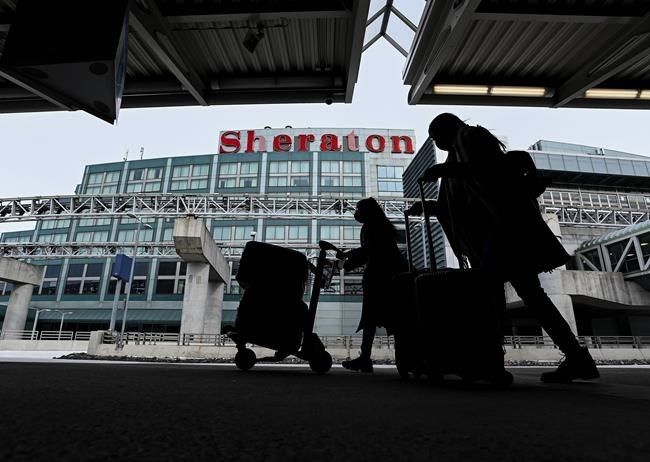As concerns about internationally identified COVID-19 variants hit closer to home, public health authorities are asking — and increasingly, ordering — people to isolate safely, away from others in their household.
Here are some examples of how hotels and quarantine facilities are being used to keep the virus from spreading through communities.
TRAVELLERS WAITING FOR TEST RESULTS
As the federal government rolls out new restrictions to prevent contagious mutations of the COVID-19 virus from crossing the border, more travellers are set to be sent to hotels and other facilities to serve at least part of their mandatory 14-day quarantine.
Under the new rules, which will take effect on Feb. 22, returning travellers will have to take a COVID-19 test at the airport at their own expense. They're then required to spend the first three days of their quarantine at a supervised hotel while awaiting their results, and foot the bill for their stay, expected to cost upwards of $2,000.
Hotel booking information will be available online as of Feb.18.
Those with negative results can serve the remainder of their two-week quarantine at home, while those with positive tests will be sent to government designated facilities.
Those arriving via the land border will also be required to take a COVID-19 molecular test on arrival, and then another COVID-19 test at the end of their quarantine. Land border arrivals do not have to stay in a hotel as part of their mandatory two-week quarantine.
Earlier this week, the federal government outlined some of the application requirements for privately owned hotels looking to be part of the three-night stay program.
The hotels must be within 10 kilometres of one of the four international airports currently accepting flights from abroad in Vancouver, Calgary, Toronto and Montreal.
Hotels will be responsible for providing three nights of lodging in keeping with public health requirements. That includes safely shuttling guests to their accommodations; offering contactless meal delivery to rooms; access to phones and internet; and reporting traveller information to authorities, such as check-in and check-out.
Safety protocols include measures to monitor movement within the hotel and ensure compliance with isolation requirements. Travellers must be sequestered from regular clients, and the hotel must have process to allow "essential and short outside time," such as smoke breaks.
FEDERALLY DESIGNATED FACILITIES FOR TRAVELLERS IN QUARANTINE
Since the outbreak took hold in Canada, Ottawa has been putting up travellers in hotels and other lodging sites as a "last resort" for those without a suitable place to self-isolate, said a spokeswoman for the Public Health Agency of Canada.
Tammy Jarbeau said in an email that the agency currently operates 11 designated quarantine facilities in nine cities across Canada, with access to two provincially run sites.
These sites had lodged 5,030 travellers, as of Jan. 24, said Jarbeau. She said the cost of the program wasn't readily available.
As of last Thursday, all international passenger flights must land at one of four airports — Vancouver, Toronto, Calgary or Montreal. Jarbeau said the government designates or cancels quarantine sites as needed, but declined to disclose their locations to "protect the privacy and safety of travellers."
ISOLATION SITES FOR NORTHERN TRAVELLERS
Two of the northern territories have long required travellers to make a public-health pit stop before entry.
To fly back to Nunavut, residents must first spend two weeks at health isolation sites in Ottawa, Winnipeg, Edmonton or Yellowknife before they can be cleared to return to their home community. The territory covers costs such as a hotel room, meals and internet access, but travellers are responsible for any additional flight expenses.
Travellers headed to Northwest Territories must self-isolate in one of four communities: Yellowknife, Inuvik, Hay River or Fort Smith. Those who don't have a place to quarantine are sent to isolation centres.
Last month, the territory said it would no longer pay to put up residents travelling for recreational reasons. Non-residents still have to cover their own accommodations.
VOLUNTARY ISOLATION SITES
A growing number of jurisdictions are setting up voluntary COVID-19 isolation sites to help people recover from the virus without putting other members of their household at risk.
Public health officials say many Canadians can't safely self-isolate at home because of crowded housing conditions, contributing to the disproportionate spread of infections in low-income neighbourhoods.
The centres offer people a free, safe place to self-isolate as well as other services such as meals, security, transportation, income support and links to health care.
The federal government has committed roughly $29 million to support municipally run isolation sites in Toronto, Ottawa and the regions of Peel and Waterloo. The Ontario government is also spending $42 million to create and expand centres in locations across the province, adding up to1,525 more beds in coming weeks.
Joe Cressy, chair of the Toronto Board of Health, said people may be referred to the city's self-isolation sites by COVID-19 case managers and community outreach workers, but individuals can access the facilities on their own accord.
Cressy said the city also runs a COVID-19 isolation site out of a hotel where people who are experiencing homelessness can stay while they're sick. He noted that this recovery program is distinct from the hotels that are being used as temporary homeless shelters to support physical distancing.
ISOLATION HOTEL INCENTIVES
In Alberta, people who need to self-isolate because of COVID-19 concerns can not only stay in a hotel room free of charge, but may qualify for a $625 relief payment upon check-out.
Earlier this week, the province expanded a temporary financial aid program intended to incentivize Albertans to self-isolate in a hotel if they can't safely do so at home.
Since December, residents of hard-hit neighbourhoods in Edmonton and Calgary have been eligible for a $625 government payment at the end of their stay.
Now, the aid is open to all Albertans who have been referred by a provincial health authority.
This report by The Canadian Press was first published Feb. 6, 2021.
Adina Bresge, The Canadian Press




